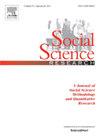Race and leadership suitability in multiracial churches: An experimental exploration
IF 3.2
2区 社会学
Q1 SOCIOLOGY
引用次数: 0
Abstract
Extensive research on multiracial churches highlights the predominance of White individuals in leadership roles. However, little is known about how leadership suitability is perceived in such multiracial contexts. This study employs a factorial conjoint survey experiment with 737 participants to investigate how participants' race/ethnicity, leadership candidates' race/ethnicity, and the racial/ethnic composition of churches influence perceived leadership suitability. The findings of this study provide evidence for multi-dimensional in-group favoritism, encompassing both personal in-group favoritism and group-oriented favoritism. Specifically, when these two types of favoritism compete, Black and Latino participants exhibit stronger personal in-group favoritism, favoring candidates from their own racial/ethnic groups. In contrast, White and Asian participants demonstrate stronger group-oriented favoritism, favoring candidates whose race/ethnicity aligns with the church's majority racial/ethnic composition. Additionally, this study identifies patterns of cross-minority solidarity among racial minority groups. While individuals generally favor candidates from their own racial groups, this preference is complemented by a broader tendency to support candidates from other racial minority groups over White candidates. Findings in this study do not support White privilege and superiority assumptions in leadership roles within multiracial church settings. Overall, this study underscores the interaction between personal identity and group dynamics in shaping perceptions of leadership, highlighting the multifaceted ways in which individual racial/ethnic identity and group racial/ethnic demographics influence perceptions of leadership suitability.
多种族教会的种族与领导适宜性:一项实验性探索
对多种族教会的广泛研究强调了白人在领导角色中的优势。然而,在这样的多种族背景下,人们是如何看待领导的适宜性的,我们知之甚少。本研究采用因子联合调查实验,探讨参与者的种族/民族,领导候选人的种族/民族,以及教会的种族/民族构成如何影响感知的领导适宜性。本研究结果为群体内偏好提供了多维度的证据,包括个人群体内偏好和群体导向偏好。具体来说,当这两种类型的偏袒竞争时,黑人和拉丁裔参与者表现出更强的个人群体内偏袒,倾向于来自自己种族/族裔群体的候选人。相比之下,白人和亚裔参与者表现出更强的群体偏好,他们倾向于与教会多数种族/民族组成一致的候选人。此外,本研究还确定了少数种族群体之间的跨少数民族团结模式。虽然个人通常更喜欢自己种族的候选人,但这种偏好与支持其他少数种族候选人而不是白人候选人的更广泛趋势相辅相成。本研究的发现并不支持在多种族教会环境中领导角色中白人特权和优越感的假设。总体而言,本研究强调了个人身份和群体动态在塑造领导力认知方面的相互作用,强调了个人种族/民族身份和群体种族/民族人口统计数据影响领导力适宜性认知的多方面方式。
本文章由计算机程序翻译,如有差异,请以英文原文为准。
求助全文
约1分钟内获得全文
求助全文
来源期刊

Social Science Research
SOCIOLOGY-
CiteScore
4.30
自引率
4.00%
发文量
0
审稿时长
65 days
期刊介绍:
Social Science Research publishes papers devoted to quantitative social science research and methodology. The journal features articles that illustrate the use of quantitative methods in the empirical solution of substantive problems, and emphasizes those concerned with issues or methods that cut across traditional disciplinary lines. Special attention is given to methods that have been used by only one particular social science discipline, but that may have application to a broader range of areas.
 求助内容:
求助内容: 应助结果提醒方式:
应助结果提醒方式:


